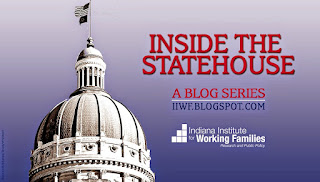- Back to Home »
- Inside the Statehouse »
- Inside the Statehouse - Week 3
Friday, January 20, 2017
Action
Alert: Support SNAP Asset Limit Removal
The Senate Family and Children Services Committee
will hear the following bills at
10:00
am – Monday, January 23, 2017
in Senate Chamber.
If your legislator is on
the committee (look up your legislator here), call and ask them to vote
YES on SB9 and SB154. If your
legislator is not on the committee, call the Chairman, Senator Grooms, at 317-234-9425, Thank him for hearing these bills and ask him to vote YES on SB9 and SB154.
Name
|
Phone
#
|
Email
|
Sen. Ronald Grooms
(Chairperson)
|
317-234-9425
|
Senator.Grooms@iga.in.gov
|
Sen. Greg Walker
(Ranking Majority Member)
|
317-232-9984
|
Senator.Walker@iga.in.gov
|
Sen. Mike Bohacek
|
317-232-9541
|
Senator.Bohacek@iga.in.gov
|
Sen. John Crane
|
317-232-9984
|
Senator.Crane@iga.in.gov
|
Sen. Jon Ford
|
317-234-9443
|
Senator.Ford@iga.in.gov
|
Sen. Erin Houchin
|
317-232-9488
|
Senator.Houchin@iga.in.gov
|
Sen. Dennis Kruse
|
317-233-0930
|
Senator.Kruse@iga.in.gov
|
Sen. Timothy Lanane
(Ranking Minority Member)
|
317-232-9427
|
s25@iga.in.gov
|
Sen. Jean Breaux
|
317-232-9534
|
s34@iga.in.gov
|
SB 154 -
The Issue: Currently, SNAP eligibility has a $2250 asset limit. Asset limits deter individuals from saving, a necessary step toward self-sufficiency. SNAP should be a safety net families can rely on in hard times; instead, asset limits force people to liquidate assets to receive nutrition support. Asset limits keep the very vulnerable, asset-poor Hoosiers from receiving SNAP because the paperwork needed to verify checking or savings accounts can be difficult to procure and/or file.
The Issue: Currently, SNAP eligibility has a $2250 asset limit. Asset limits deter individuals from saving, a necessary step toward self-sufficiency. SNAP should be a safety net families can rely on in hard times; instead, asset limits force people to liquidate assets to receive nutrition support. Asset limits keep the very vulnerable, asset-poor Hoosiers from receiving SNAP because the paperwork needed to verify checking or savings accounts can be difficult to procure and/or file.
Enforcing the asset limit costs Indiana taxpayers money. Surrounding states (Illinois, Ohio, and Kentucky) have removed their asset limits and have lower administrative costs per case. Asset limits also lead to churn. A gift or a few extra shifts at work can push someone over the asset limit, but two months later they qualify and apply again, costing taxpayers to process those applications. In states that removed asset limits, churn decreased by about 26%.
Asset limits place the
burden of food access on non-profit organizations and charities, where the food
supply is inconsistent and supplemental. Only 1 of every 20 bags of groceries
received by food insecure households comes from an emergency food provider.
SB 9 - This bill would indicate that Indiana is opting out of the federal law prohibiting individuals convicted of certain drug offenses from receiving SNAP assistance. Please ask your Senator to support this bill.
SB 9 - This bill would indicate that Indiana is opting out of the federal law prohibiting individuals convicted of certain drug offenses from receiving SNAP assistance. Please ask your Senator to support this bill.
Also next week:
HB 1002: Transportation infrastructure funding (Soliday) will be heard in a joint meeting of House Roads and Transportation and House Ways and Means on Wednesday, January 25, 2017 at 9 am in the House Chamber.
SB 276: Early education grant pilot program (Holdman) will be heard in Senate Education and Career Development on Wednesday, January 25, 2017 in the Senate Chamber.
SB 474: Small loans (Melton) will be heard in Senate Insurance and Financial Institutions on Thursday, January 26, 2017 at 8:30 am in Rm. 130. This bill is a good first step and addresses some of the issues in payday lending. However, these reforms don't go far enough to protect consumers and therefore the Institute recommends that the General Assembly follow through on the study committee on payday lending that was urged in House Enrolled Act 1340 from the 2016 session.
Please note that the schedules above are current as of January 20, 2016. It is always important to verify the scheduling of bills and sessions on the General Assembly's website as these can and frequently do change.
_______________________________
- A PATH TO SELF-SUFFICIENCY: Put families on a path to self-sufficiency by protecting them from high-cost payday loans and predatory lending products. Support asset-building and financial literacy training by increasing funding for individual development accounts (IDAs).
- INVESTMENT IN TWO-GENERATION SOLUTIONS: Investments in Head Start, preschool and the Child Care Development Fund (CCDF) ensure that young children continue to learn and grow while their parents work or seek further education.
- REMOVE BARRIERS TO ADULT EDUCATION & WORKFORCE TRAINING: Allow for better coordination of skills training, higher education and necessary support services. Increase support for the Indiana Adult Student Grant and the WorkINdiana training program, and create Indiana’s first fund for job-driven adult literacy.
- ASSISTS & REBOUNDS: Help Hoosiers rebound more quickly from tough times by removing the asset test from Supplemental Nutrition Assistance Program (SNAP) eligibility requirements and raising Temporary Assistance for Needy Families (TANF) eligibility to 50 percent of the federal poverty level.
- QUALITY OF LIFE & QUALITY OF WORK: Ensure that all working Hoosiers can balance work, family and household budgets through policies that promote fair scheduling, paid leave and high-quality, well-paying jobs.
- BUILD A MORE JUST HOOSIER ECONOMY, STARTING WITH EQUITABLE BUDGET CHOICES: Make equitable budget choices that remedy Indiana’s regressive tax structure, increase economic mobility for working families and promote a more just economy for all Hoosiers.
For a complete list of bills the Institute is following this session, check out this Inside the Statehouse post.
For more resources and frequent updates, like the Indiana Institute for Working Families on Facebook and follow us on Twitter. If you believe in our work and want to amplify our message at the Statehouse, we welcome your donations.










